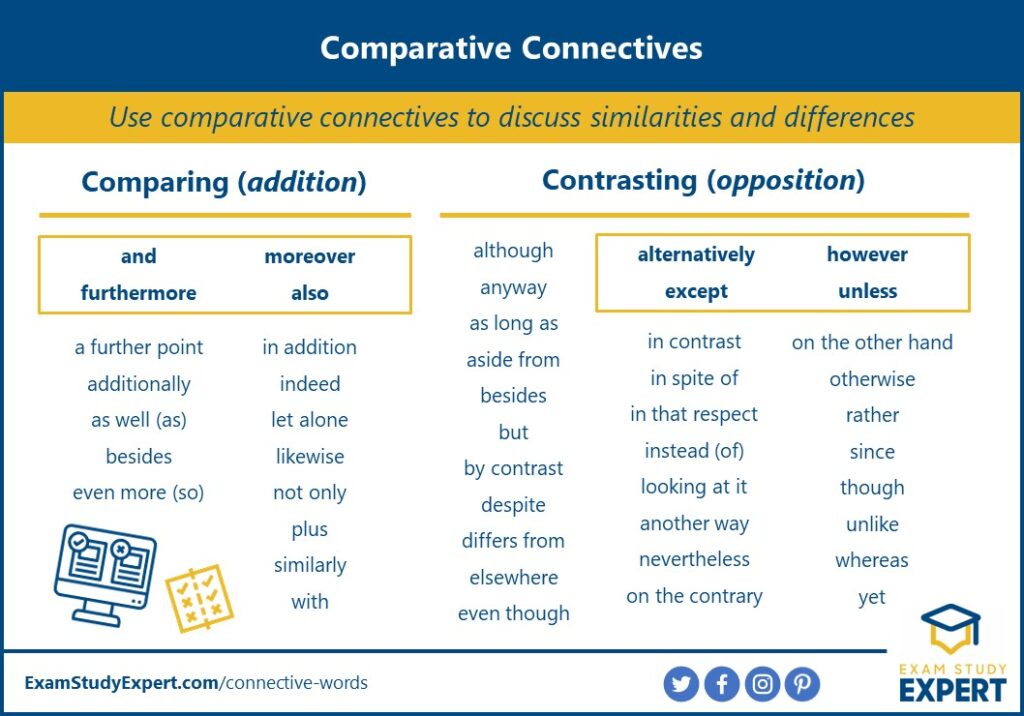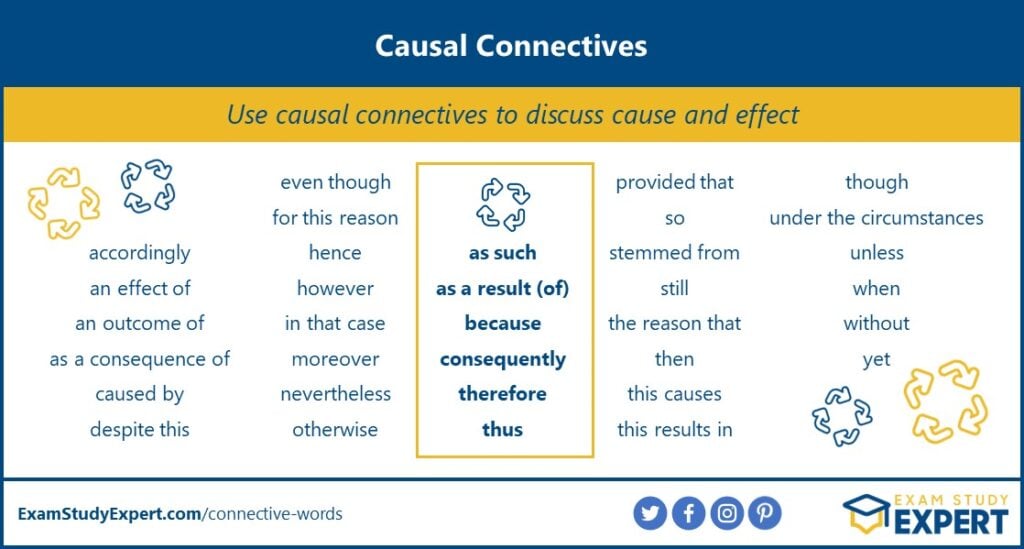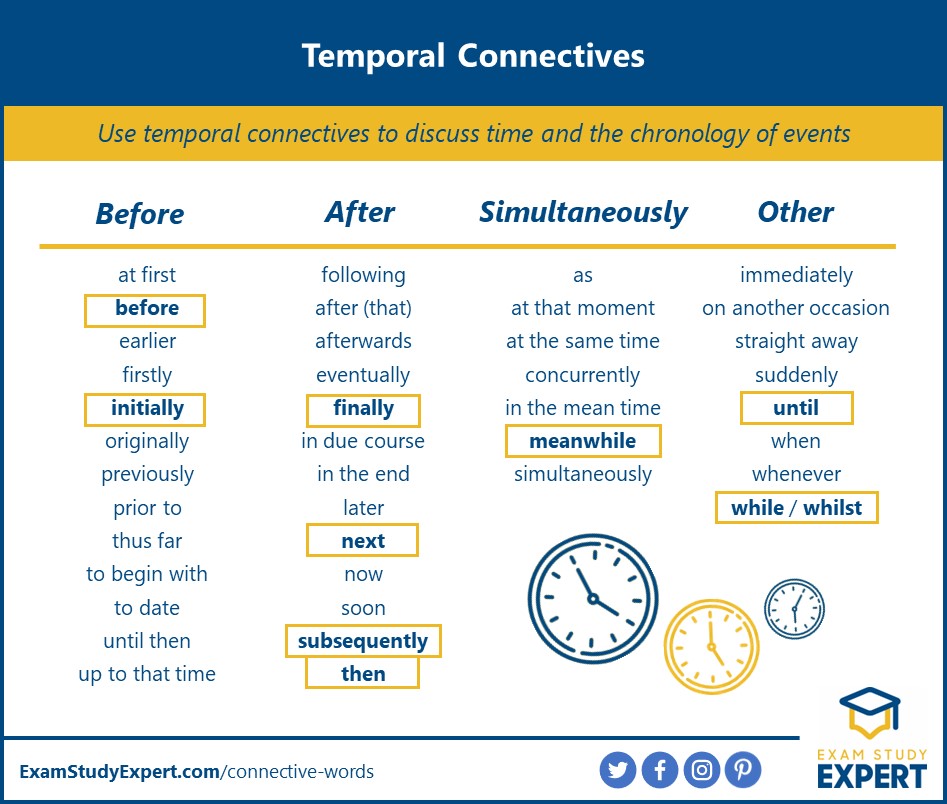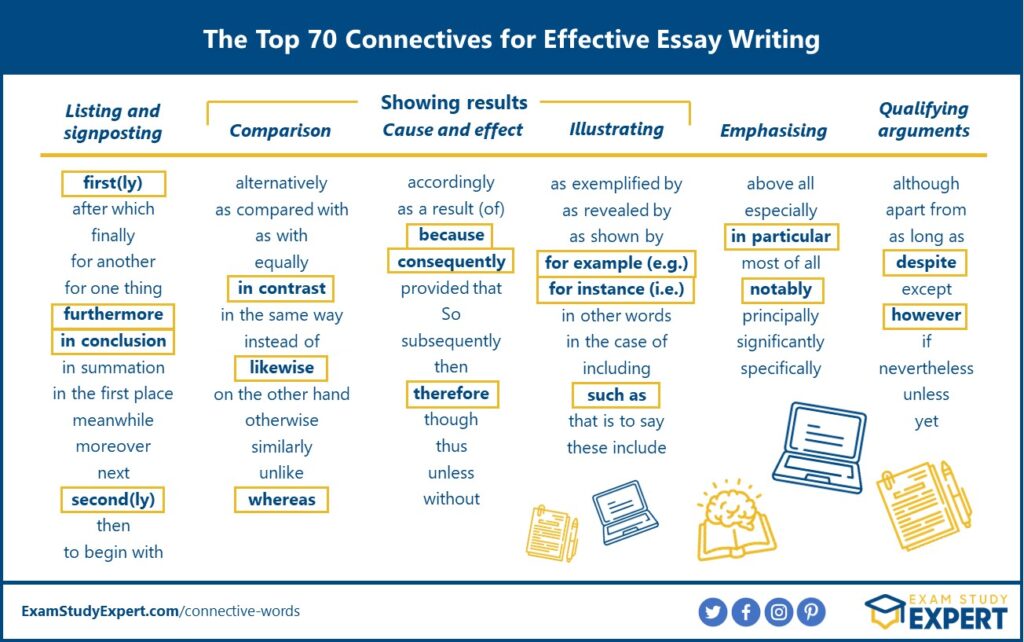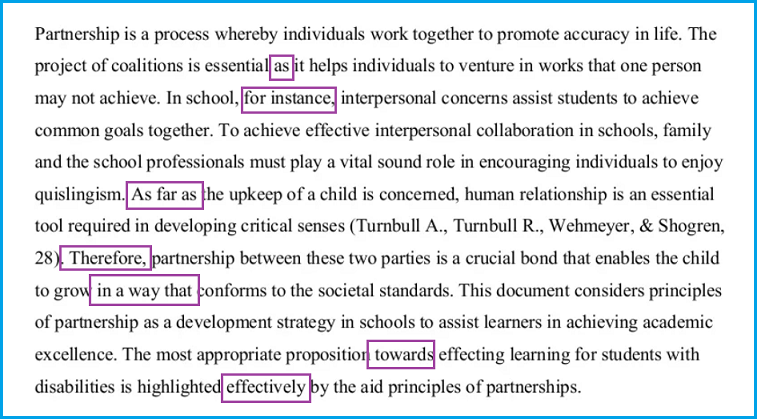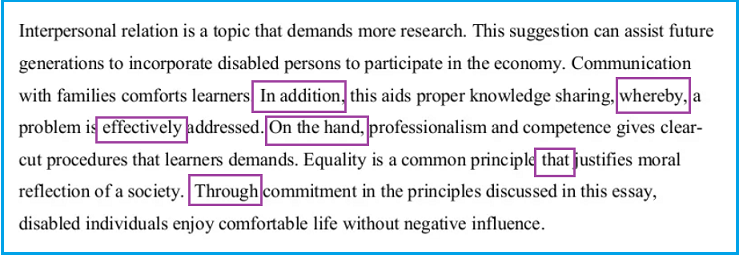
50 Persuasive Examples of Essay Connectives In Use Today
Essay connectors are words or phrases used to show the logical relationship between the points. They help to achieve an essay flow – preventing the essay from appearing as a loose collection of points, among which the reader ‘jumps about’ randomly. An article without essay connectives may lead to a disconnect of the reader from what the writer intended.
Connectives to use in an essay are carefully assembled and creatively applied to achieve a top-notch piece. The writer should ensure that the sentences make sense to him/her first before settling on special connectors for essays.
In the following extensive paragraphs, we are going to explore some of these top connective words and phrases. Where possible, a sentence example may be added for each connector to give you an idea of how to use the connectives in speech.
Connectors Showing Reason and Cause
They are used when justifying why an action or an event seemed possible or appropriate. Some of the top connector words for reason or cause include:
- Owing to
- Consequently
- As a result
- Seeing that
- Thus
- Because of
- Hence
- On account of
- Since
- To
- Because
- Therefore
- To
- Accordingly
- Due to
- It suggests that
- It follows that
- For this reason
Example in a Sentence: Because of the government directive, we decided to stay at home.
Connective Words for Adding Information
When writing your essay, you can use such paragraph connectors to emphasize a point. The following are some top-class connectives used to add information.
- For example
- To illustrate
- Such as
- To clarify
- Besides
- Further
- Apart from
- First, second and third
- Except for
- Moreover
- Typically
- For instance
- Namely
- Also
- In fact
- Especially
Model in a Sentence: Apart from washing hands, we can prevent Corona Virus by using a face mask and social distancing.
Connectives for Succession
One can use these transitions for essays when showing the progression of actions or events. They include the following:
- First of all / firstly
- To begin with
- Second / Secondly
- Then
- Third / Thirdly
- After that
- The next stage
- Finally
- In short
Example in a Sentence: To begin with, you have to get your hands, then apply soap, wash for at least 20 seconds and finally dry your hands.
Showing Comparison and Contrast
Connectives in speech used here show either differences or similarities expressed in a particular essay. Examples include:
- But
- Alternatively
- Though
- In contrast
- However
- Although
- Conversely
- Nevertheless
- On the other hand
- Instead
- Instead of
- Yet
- Whereas
- On the contrary
- Despite
- All the same
Model in a Sentence: Although he stayed indoors, he still contracted the dreaded COVID-19 and died.
Connectives for Expressing Personal Opinion
These are essay connectives used to show a personal view or attitude towards a particular subject. They include:
- Personally
- According to my understanding
- As far as I am concerned
- I think that
- I disagree
- In my view
- I agree
- in my opinion
- To tell the truth
- It is true that
- To be honest
- From my point of view
Example in a Sentence: As far as I am concerned, wearing a sweater on a cold day may not be practical as wearing a trench coat.
Connectors for Explaining
Such transition words are used when making an essay idea clear to the reader. One may opt to use the following transition words list.
- All in all
- Basically
- In general
- More or less
- In other words:
- In short
- On the whole
- Especially
- To a certain extent
- That is
- Above all
- At least
- Essentially
- In particular
Example in a sentence: Basically, different types of face masks need a doctor’s authorization before use.
Summarizing Essay Connectors
They are used to mark the conclusion of your essay. The readers can ascertain the finality in your article when such a summarizing connector is used. They include:
- To sum up
- In conclusion
- In short
- On the whole
- All in all
- In brief
Connective words ensure clarity and conciseness as much as possible. It can only be achieved when the right words are used to convey your argument.
Do you need writing help to achieve a smarter paper, without generally detracting from your ideas? Contact our able team of professional writers today.
Нам бывает непросто выразить свои мысли лаконично и связно, когда мы общаемся на английском, пишем электронные письма по работе, отправляем сообщения иностранным друзьям. Сегодня расскажем, какие связующие выражения и вводные слова можно использовать, чтобы сделать вашу речь красивой, понятной и логичной.
Что такое linking words
Для начала нужно разобраться, что такое linking words и зачем их нужно знать.
Linking words — это связующие элементы, которые употребляют для логического перехода от одной мысли к другой. Они сделают вашу речь или письмо понятнее для англоговорящего читателя и обеспечат более высокий балл при сдаче любого экзамена. По-другому их называют discourse markers — маркеры беседы, связующие обороты речи.
Linking words могут быть выражены отдельными словами (например, however) или фразами (например, as a result), относиться к разным частям речи и употребляться в разных частях предложения.
| Часть речи | Слова-связки | Место в предложении | Пример |
|---|---|---|---|
| Союз | Like, because, although | В большинстве случаев ставятся в середине предложения, но могут быть и в начале, например although. | Although shopping online is quite cheap, delivery periods can be very long. — Несмотря на то, что покупать онлайн довольно дешево, сроки доставки могут быть очень долгими. |
| Предлог | Due to, despite the fact that, because | Ставятся перед существительными. | Young professionals are moving abroad because of low salaries in their native country. — Молодые специалисты переезжают за границу из-за низких зарплат в их родной стране. |
| Наречие | Therefore, indeed | Ставятся в начале предложения, выделяются запятыми. | The deadlines of the project are close. Therefore, we need to begin the launch of our product. — Сроки завершения проекта поджимают. Поэтому нам нужно запускать наш продукт. |
Linking words можно разделить на множество групп в зависимости от их функции (противопоставление, добавление новой информации, введение, заключение и т. д.). Давайте разберем каждую группу отдельно.
1. Purpose — цель написания
Эта группа наиболее важная, ведь в любой письменной работе мы указываем цель ее написания. Эссе, письмо другу или e-mail по работе — в большинстве случаев мы начинаем с объяснения, зачем мы пишем тот или иной текст. Например:
- in order to do smth, so as to do smth — чтобы сделать что-то;
- so that — чтобы;
- to that/this end — с этой целью.
I am writing to you so as to confirm my participation at the conference. — Я пишу вам, чтобы подтвердить свое участие в конференции.
I would like to confirm my participation at the conference so that there is no misunderstanding. — Я бы хотел подтвердить свое участие в конференции, чтобы не было недопонимания.
Zoologists are seeking to understand how animals communicate with each other. To that end, a new study has been launched. — Зоологи пытаются понять, как животные общаются друг с другом. С этой целью было начато новое исследование.
Хотите как можно скорее заговорить на английском? Тогда записывайтесь на бесплатный пробный урок.
2. Opinion and emphasizing — выражать мнение и акцентировать внимание
Это также одна из наиболее полезных групп linking words, так как во многих письменных заданиях необходимо выразить свое мнение по поводу той или иной идеи. Наиболее употребляемая фраза — in my opinion (по моему мнению). Как же можно заменить это выражение?
- in my view, to my mind, to my way of thinking — на мой взгляд, по моему мнению;
- personally, I believe that — лично я думаю, что;
- I feel strongly that — я глубоко убежден, что;
- I am inclined to believe that — я склонен полагать, что;
- it strikes me that, it seems to me that — мне кажется, что;
- as far as I am concerned — насколько мне известно.
To my way of thinking, in any occupation talent is more important than skills. — На мой взгляд, в любой профессии талант важнее умений.
I am inclined to believe that the problem of malnutrition in poor countries doesn’t depend on technological development. — Я склонен полагать, что проблема недоедания в бедных странах не зависит от развития технологий.
It strikes me that there is a larger issue in the team. — Мне кажется, что в команде есть еще более весомая проблема.
Иногда хочется подчеркнуть особую важность того или иного факта. Следующие слова помогут красочно, а главное, правильно это сделать:
- clearly, obviously — определенно, очевидно, бесспорно;
- needless to say — само собой разумеется;
- significantly, importantly — что особенно важно.
Clearly, if everyone were allowed to carry a gun, the crime rate would rise. — Бесспорно, если бы каждому было позволено носить оружие, уровень преступности возрос бы.
Importantly, the writer was being employed by the leading party when he wrote this work, and was therefore under pressure. — Что особенно важно, писатель работал на ведущую партию, когда написал данную работу, и поэтому был под давлением.
3. Listing facts and addition — перечисление фактов и добавление новой информации
В подтверждение вашему мнению зачастую необходимо привести ряд доказательств. Правильно и логично их выразить помогут следующие связующие слова и фразы, они всегда на письме выделяются запятой.
- firstly, first of all — во-первых;
- first — для начала;
- to start with, to begin with — прежде всего;
- in the first place — в первую очередь;
- secondly — во-вторых;
- thirdly — в-третьих;
- then, next — затем;
- afterwards, after that — после этого;
- finally — наконец;
- lastly — в заключение;
- last but not the least — последнее, но не менее важное.
To begin with, you should wash the wound in the cold water. Next, wrap a bandage around the cut. Lastly, put the patient in a comfortable position. — Прежде всего, вам следует промыть рану холодной водой. Затем обмотайте рану бинтом. В заключение, положите пациента в удобное положение.
Если вы хотите добавить какую-либо информацию к своему высказыванию, используйте подходящие слова-связки. Одна из типичных ошибок — это постоянное использование союза and (и) и also (также). В английском языке существует множество альтернативных слов и фраз:
- moreover, furthermore, in addition — более того (используются в начале предложения);
- besides — кроме того;
- as well as — так же, как и;
- coupled with — наряду с;
- not only … but also — не только …, а также и;
- not to mention, to say nothing of — не говоря уже о (используется, чтобы подчеркнуть новый аргумент);
- on top of that — сверх всего прочего, вдобавок ко всему;
- not only that, but — при этом.
That war caused suffering to millions of people worldwide, not to mention its impact on countries’ economy. — Эта война обрекла на страдания миллионы людей по всему миру, не говоря уже о ее влиянии на экономику стран.
The characters of the novel missed their train, and on top of that they were alone in the middle of nowhere. — Герои романа опоздали на поезд, и вдобавок ко всему они остались одни в глуши.
4. Contrast — противопоставление
Уметь правильно высказать противоположные мнения или факты также важно. Вместо обычного but (но) употребляйте следующие linking words:
- however — однако;
- on the one hand — с одной стороны;
- on the other hand — с другой стороны;
- having said that — вместе с тем, при этом;
- then again, that said — впрочем, хотя;
- yet — тем не менее (если стоит в начале предложения);
- despite smth, in spite of smth, notwithstanding smth — несмотря на что-либо;
- nonetheless, nevertheless — несмотря на это, все равно.
It is well known that the first landing on the Moon took place on July 20, 1969. Having said that, some people assert that it is a hoax. — Всем хорошо известно, что первая высадка на Луну была 20 июля 1969 года. При этом некоторые утверждают, что это ложь.
The manager says that a fire was the reason for what happened. Then again, it’s possible that he was paid to say this. — Менеджер утверждает, что причиной случившегося стал пожар. Впрочем, возможно, что ему заплатили, чтобы он так сказал.
Ann was not doing well in her physics course. Yet, she managed to get a high grade in the final exam. — Анна не очень хорошо училась по физике. Тем не менее ей удалось получить высокую оценку за итоговый экзамен.
Notwithstanding some members’ objections, the company went ahead with the plan. — Несмотря на возражения некоторых членов, компания продолжила идти по намеченному плану.
The research had its limitations, but it was important for us nevertheless. — В исследовании были свои ограничения, но оно все равно было важным для нас.
5. Comparing — сравнение
При сравнении двух точек зрения можно использовать следующие linking words:
- likewise, similarly — равно как и, таким же образом, аналогично;
- whereas — тогда как;
- conversely — и наоборот, в свою очередь;
- by contrast, in comparison — напротив, зато, в противоположность;
- although, even though — хотя;
- unlike — в отличие от.
Cars must stop at red traffic lights. Likewise, bicycles have to stop too. — Машины должна останавливаться на красный свет. Таким же образом должны поступать и велосипедисты.
People who aim to climb corporate ladders develop this trait while growing up. Conversely, people who search for stability acquire these values in their childhood. — Люди, которые стремятся идти по карьерной лестнице, приобретают эту черту характера пока взрослеют. В свою очередь, люди, которые ищут стабильность, получают эти ценности в детстве.
The marketing department suffers from absenteeism. By contrast, the call center employees are performing very well. — В отделе маркетинга наблюдается проблема отсутствия работников без уважительной причины. Зато сотрудники колл-центра работают очень хорошо.
The village festival went well, unlike the previous year when very few people came. — Сельский праздник прошел хорошо, в отличие от предыдущего года, когда собралось совсем мало людей.
6. Cause and consequence — причина и следствие
Важно уметь не только выражать свое мнение, но и аргументировать его. Многие изучающие английский язык делают ошибку, используя только because (потому что) и so (поэтому), тогда как существует множество синонимичных слов и фраз для выражения причин или следствий:
- Cause — причина
- since, as — так как;
- owing to the fact that, due to the fact that — в связи с тем, что;
- on the grounds that — исходя из того, что;
- in view of, in light of — принимая во внимание, исходя из;
- because of — из-за.
Since they had to wait for the train, they decided to have a cup of coffee. — Так как им нужно было ждать поезд, они решили выпить по чашке кофе.
Many members have objected to the proposal on the grounds that it would be too costly. — Многие члены не одобрили предложение исходя из того, что оно может быть слишком затратным.
In view of the late hour, the chairman decided to put off that discussion until the next meeting. — Принимая во внимание позднее время, председатель решил отложить обсуждение до следующего собрания. - Consequence — следствие
- consequently — следовательно;
- as a result — в результате этого;
- as a consequence — вследствие этого, как следствие;
- therefore — поэтому;
- for this reason — по этой причине, в силу вышесказанного;
- thus — так, таким образом.
Nowadays young adults receive a lot of help from their parents. As a consequence, they are remain unemployed longer than previous generations did. — Сегодня молодые люди получают много помощи со стороны родителей. Вследствие этого они остаются безработными дольше, чем представители предыдущих поколений.
We were unable to get funding. For this reason, we had to abandon that idea. — Нам не удалось получить финансирование. По этой причине нам пришлось оставить эту идею.
This plan will reduce waste, and thus cut costs. — Благодаря этому плану мы сможем сократить количество отходов и таким образом снизить расходы.
7. Example — пример
Помимо всем известного выражения for example (например) есть и несколько других вариантов linking words, позволяющих привести пример:
- for instance — например;
- to give an illustration — наглядно показать;
- such as — такой как, а именно;
- particularly, in particular, especially — в особенности.
Some birds migrate to avoid harsh winter climates. Swallows, for instance, leave the UK in early winter and fly south. — Некоторые птицы мигрируют, чтобы избежать суровых зим. Ласточки, например, ранней зимой улетают из Великобритании на юг.
To give an illustration of what I mean, let’s look at the case of obesity. — Для наглядности давайте рассмотрим проблему ожирения.
If you want to decrease your chances of having a heart attack, you should reduce your intake of meat, in particular red meat. — Если хотите уменьшить вероятность инфаркта, вы должны сократить потребление мяса, в особенности красного.
8. Condition — условие
Следующая группа linking words позволит добавить уточнение к уже сказанному или сделать оговорку:
- provided that, providing that, providing, on the condition that — при условии, что;
- in the event of, in case of — при возникновении, на случай (после ставится существительное);
- in the event that, in case — в случае, если.
He can borrow my car providing he doesn’t drive too fast. — Он может взять мою машину при условии, что не будет ехать слишком быстро.
It’s better to take an umbrella in case of rain. — Лучше взять зонтик на случай дождя.
In the event that trouble starts, lock all the doors! — В случае если начнутся волнения, закрой все двери!
Если вы хотите говорить грамотно, свободно выражать свои мысли и не делать ошибок на письме, запишитесь на курс «Практическая грамматика».
9. Introduction and conclusion — введение и заключение
В этой части разберем, какие слова-связки подходят для введения и заключения:
- Introduction — введение
Зачастую в начале письменных работ можно привести какое-то общеизвестное мнение или факт, таким образом представив тему, о которой пойдет речь. Употребляйте следующие фразы:
- it is widely believed that — многие считают, что / повсеместно считается, что;
- people often claim that — люди часто утверждают, что;
- some people argue that — некоторые люди приводят аргументы, что / утверждают, что;
- as a general rule, generally — как правило, обычно;
- on the whole, in general — в целом, в общем.
It is widely believed that the Earth is the only planet in our solar system where life is possible. — Считается, что Земля — это единственная планета в нашей солнечной системе, где возможна жизнь.
As a general rule, people who exercise regularly do not suffer from stress. But some people argue that they are still exposed to stress-related problems. — Как правило, люди, которые регулярно делают физические упражнения, не страдают от стресса. Но некоторые утверждают, что они все равно подвержены проблемам, вызванным стрессом. - Conclusion — заключение
- taking everything into account, all things considered — принимая все во внимание;
- as was previously stated — как уже отмечалось ранее;
- in conclusion — в заключение;
- to sum up — подводя итог;
- above all — главным образом, а главное;
- all in all — подводя итог изложенному выше, отметим.
All things considered, we can state that the general situation in the region is improving. — Принимая все во внимание, можно заявить, что общая ситуация в регионе улучшается.
To sum up, it is unlikely that mankind will ever bring an end to all wars. — Подводя итог, маловероятно, что человечество когда-либо положит конец войнам.
Above all, it is important to remember that natural resources are depleting. — Главное, важно помнить, что природные богатства истощаются.
All in all, the problem of civil war victims in these countries still remains. — Подводя итог изложенному выше, отметим, что проблема жертв гражданской войны в этих странах по-прежнему существует.
Теперь вы сможете более уверенно высказывать свое мнение, выражать несогласие или наоборот поддерживать точку зрения своего собеседника. Предлагаем вам повторить пройденный материал и пройти тест.
Тест по теме «Слова-связки в английском языке»
Скачать список лексики по теме «Слова-связки в английском языке» (*.pdf, 235 Кб)
© 2023 englex.ru, копирование материалов возможно только при указании прямой активной ссылки на первоисточник.
Когда мы общаемся с людьми, то наша основная цель — передать информацию и быть правильно понятыми. Достичь этого будет гораздо проще с помощью специальных слов–связок – «linking words» или «linkers» – которые не просто украшают речь, но и помогают собеседнику понять сюжет вашего сообщения.
В русском языке мы также используем подобные слова: «например», «поэтому», «прежде всего», «в общем», «кроме того», «несмотря на это», «очевидно» и т.д. Давайте разберемся, какие английские эквиваленты таких слов и выражений входят в необходимый минимум для свободного общения
Пройдите тему в онлайн тренажере:
- Топ 100 слов уровня Pre-Intermediate
- Топ 100 слов уровня upper-intermediate
- Топ 100 слов уровня Intermediate
- Топ 100 фразовых глаголов
- Топ 100 слов уровня Elementary
Одной из основных целей каждого человека, изучающего иностранный язык, является сделать свою речь как можно более богатой, непринуждённой и приближённой к оригинальному варианту разговора.
Самый простой пример это слово and (и). Да, это союз, но в сложных предложениях он выступает связующим звеном между простыми предложениями.
Связующие слова нельзя отнести к определённой части речи, так как словом-связкой может быть и союз, и наречие, и предлог, и частица и так далее. Но основная функция этих помошников заключается в том, что они придают нашим высказываниям логически завершённую форму, такой себе четкий контур, к которому стремилась наша мысль.
| Категория | Слова и выражения | Пример |
| Причина и эффект | because (of) — потому что; так как; затем что; ибо; ввиду того, что; so — же; насколько; чтобы, таким способом, указанным образом, с тем чтобы; так; accordingly — соответственно; таким образом; следовательно; поэтому; в соответствии; thus — следственно, таким образом, в силу этого, так что, благодаря этому; consequently — следовательно; в результате; поэтому; вследствие этого; hence — следовательно; в результате; отсюда; therefore — по этой причине; вследствие этого; следовательно; потому; as – так как, ; оттого что; в связи с тем что; в силу того, что; due to (the fact that) – в связи с, согласно (тому что), по причине, исходя из, из-за, вследствие; owing to – по; из-за; вследствие; по причине; благодаря; since – по той причине что, учитывая, что. |
We had to wait because, it was raining. — Нам пришлось подождать, потому что шел дождь. |
| Акцентирование внимания | typically – как правило, типично, по большей части, как обычно, в большинстве случаев; as a general rule – как правило; обычно; в общем и целом; surprisingly – поразительно; на удивление; как ни странно; неожиданно; obviously – очевидно; безусловно; конечно; чересчур открыто; разумеется; in fact – собственно; фактически; более того; кстати; вообще; вообще-то; especially – в особенности; главным образом; в частности; особенно; clearly – бесспорно, прямо, разумеется, явно, четко, понятно; importantly – что немаловажно, важно; значительно; |
I don’t want to talk about this, especially with her. – Я не хочу говорить об этом, особенно с ней. |
| Сравнение | similarly — подобным образом; так же; аналогично; подобно; сходно; точно так ж; likewise — также; более того; тоже; так же, таким же образом; whereas — исходя из того, что; с учётом того, что; в связи с тем, что; on the other hand — зато; с другой стороны; но с другой стороны; впрочем; однако; except — за вычетом/исключением; кроме как; не говоря о; помимо; by comparison — для сравнения, в то время как; сравнительно; when compared to — по сравнению с; equally — в равной степени; одинаково; равно; наравне; in the same way — точно таким же образом; подобным образом; |
Life is difficult in extreme polls; similarly, it is horrible near the Equatorial regions. |
| Контраст | however — однако; yet — при этом, с другой стороны, впрочем, в то же время; still — при этом; even though — но хотя; несмотря на то,что; и хотя; даром что; on the other hand — хотя, с другой стороны, что же касается; otherwise — без этого, в противном/ином случае; after all — ведь, как-никак, не стоит забывать что, к тому же, напоследок; on the contrary — как раз наоборот, совсем наоборот, на самом деле, напротив; in contrast — в отличие от этого; для сравнения; напротив; unlike — в отличие; instead of — взамен; чем (вместо чего-л.); вместо; alternatively — или же; вперемежку; поочерёдно; иначе; наоборот; although, even – даже если; but – но, ведь; всего; исключая; хотя; |
Simon did not pass the exam then; nevertheless, he got high skills in English now. — Саймон не справился с экзаменом тогда, как бы то ни было, у него все отлично с английским сейчас. |
| Дополнение | and — и, причем, а не, при этом, а также, тогда как; also — тоже; притом; при этом, а еще, также, в том числе, кроме того; even — вровень; даже; точно; хоть; на одном уровне; ровно; again — снова, опять же, вновь; ещё раз; к тому же; кроме того; вдвое; further — к тому же, также, еще; к тому же; similarly — подобным образом; так же; аналогично; подобно; сходно; точно так же; as well as — а также; а также и; так же как; также; заодно и; apart from – кроме. исключая; наряду; не говоря о; независимо; оставляя в стороне; besides – кроме того; помимо того; также; вдобавок к тому; кроме; помимо; кстати; in addition – к тому же; moreover – кроме того; более того; сверх того; к тому; мало того; too – очень; крайне; также; тоже; к тому же. |
It is very hot today; moreover, there is a power outage. — Сегодня очень жарко, кроме того, произошел перебой питания. |
| Пример, подтверждение | for instance — например; in this case — в этом случае; in another case — в другом случае; in this situation — в данной ситуации; in this manner — таким образом, таким способом, эдак (этак); to illustrate — для иллюстрации / наглядного примера; to my mind — на мой взгляд, по моему мнению; in my opinion – по моему мнению, на мой взгляд; from my point of view – с моей точки зрения; for example – например; as follows – следующий; such as – такой как; |
I think he is very rich; for example, he gave a hundred bucks to a hobo. — Я думаю, он очень богат, например, он дал 100 баксов бомжу. |
| Последовательность | first — в первую очередь, во-первых, первоначально; second — во вторую очередь, во-вторых, в следующих, далее; third — в-третьих, в третью очередь, третье; next — далее, следующим шагом, потом; затем; после; then — затем, позже; после чего, то время; в дальнейшем; following — исходя из этого, в результате, вследствие; now — теперь, нынче, вот, итак, в настоящее время; at this point — на данный момент, на этой стадии; на этом месте, пока что; after — после; eventually — в конечном счёте; в итоге; со временем; однажды; finally — наконец, в конце; в заключение; под конец; в конце концов; в конечном счёте; lastly — на последнем месте, в конце; в заключение; под конец, наконец; previously — предварительно; заранее; ранее; прежде; раньше; уже; |
First, I’d like to get to know you. — Сперва, я бы хотел познакомиться с тобой. |
| Подведение итогов | on the whole — в целом; учитывая все обстоятельства; в итоге; вообще; в среднем; in sum, to sum up, in summary – подводя итог; thus — таким образом, отсюда и; as a consequence – как результат, в результате, соответственно, и, как следствие; as a result – в результате; hence – таким образом, исходя из этого, получается, следственно; in brief, in short – коротко, вкратце; in conclusion – в заключение, в завершении, напоследок, подводя итоги; so – итак, therefore – таким образом, по этой причине; вследствие этого; следовательно; потому; to conclude – делая выводы; |
In brief, it is a good film. — Короче, это хороший фильм. |
Читай также
Без бренда нет тренда: English for Marketing and Advertising
Время и последовательность
Если мы рассказываем о каком-то процессе, например, приготовлении салата или строительстве дома, и хотим логически выделить его этапы, то нам пригодятся такие слова-связки:
- firstly, to begin with, for a start, first of all — начало процесса;
- after that, next, secondly, subsequently — продолжение;
- to conclude, finally, last of all — завершение.
Советуем к прочтению: Чем отличается Start от Begin?
First of all, choose the place where you would like to spend your holidays. After that, you should book tickets and a hotel room. Finally, you can start packing suitcases.
Дополнение
Когда мы дополняем сказанное новыми фактами, можно использовать следующие фразы:
in addition to, apart from, besides, moreover, as well as, also.
Apart from the budget, we discussed new marketing strategies.
Высказывание своей точки зрения
Иногда нужно подчеркнуть, что какая-то идея — это именно ваше мнение. С одной стороны, вы можете выделить оригинальность вашей мысли, с другой стороны, такое высказывание звучит менее категорично и более вежливо. Вот некоторые связующие слова для выражения ваших собственных суждений:
- to my mind, it seems to me;
- inclined to think, strongly believe.
I am inclined to think that our government should take more effective steps to protect the environment.
Ссылка на других
Это очень даже по-английски — преподносить какой–либо факт, ссылаясь на общественное мнение. Как и в случае с собственной точкой зрения, это помогает избежать категоричности и делает любое заявление более лояльным:
- it is said that, it is usually believed, it is claimed that;
- people often think, some people argue that.
It is usually believed that black cats bring bad luck.
Пример и подтверждение
Чтобы убедиться, что вас поняли правильно, можно повторить основные моменты другими словами или с использованием конкретных примеров:
- in other words, for example, to illustrate;
- namely, one example of this.
Nowadays, healthy lifestyle is becoming really popular. For exampe, the fact that more and more people stop smoking.
Сравнения и контраст
Иногда нам нужно показать контраст между несколькими явлениями или фактами, иногда мы хотим найти сходство между ними. В обоих случаях можно использовать соответствующие слова–связки:
- in contrast, in spite of, however, in comparison with, unlike — эти слова показывают различия;
- similarly, just like, likewise, in the same way, equally — способы передачи сходства.
I have always liked reading books, unlike my brother, who really hates it. However, we enjoy watching movies together.
Причина и эффект
Если мы хотим донести до собеседника логическую структуру каких-то событий, показать, что именно привело к таким последствиям, то нам помогут такие фразы:
- because of, due to, since, as;
- therefore, consequently, as a result, so.
Yesterday he was stuck in a traffic jam. Because of that he was late for the meeting.
Акцентирование внимания
Чтобы подчеркнуть значимость своих слов, обратить на них внимание собеседника, возьмите себе на вооружение некоторые из этих слов:
- indeed, in fact, particularly, no doubt, obviously,
- needless to say, as a matter of fact, surely, certainly.
Needless to say, I was really glad to receive such a nice present.
Предложение альтернативы
Если у нас есть возможность рассмотреть другие варианты развития событий, почему бы не показать это? Всегда приятно иметь выбор, поэтому берите любое словосочетание из этой подборки:
- on the other hand, alternatively;
- the alternative is, another possibility would be.
Not everyone can find enough free time for attending English courses. The alternative is to study English via Skype.
Подведение итогов
Когда вы делаете выводы, нелишним будет повторить основные пункты с помощью определенных связующих слов:
- as has been noted, finally, in brief, in short,
- to summarise, in conclusion.
In conclusion, I’d like to say that this contract is extremely important for our company.
Читай также
«Я понял, но не все» — что делать?
Заключение
Мы надеемся, что отныне ваша речь станет более красивой, благодаря данной статье. To summarize, хотелось бы добавить 3 общих совета по использованию слов-связок. Помните, что:
- все хорошо в меру, поэтому не стоит переусердствовать с количеством;
- лучше освоить 10 простых linking words, чем быть непонятым из-за употребления сложных;
- даже если какое-то выражение вам очень нравится, не стоит начинать с него каждое предложение.
Студенты, которые занимаются на наших занятиях по Скайпу, так любят фразу «I think», котора легко заменяется на «I believe» или «I suppose». Keep that in mind and be creative!
Спасибо за внимание и до скорой встречи!
Большая и дружная семья EnglishDom
When you’re writing an essay or assignment, you need to use every trick in the book to maximise your marks. And one of the best tools for radically improving your writing is the power of connective words.
Used correctly, connective words can give your writing new depth and meaning, improve readability (important for your examiner!) and demonstrate the logic of your arguments.
Luckily for you, we’ve got plenty of categories, definitions and connectives examples to help you get started…
Table Of Contents
- What are connective words?
- How to use connective words
- Types of connective words
- The TOP 70 connective words for effective essay writing!
- Good luck with your essay!
- The Science Of Studying Smart
Psst – this article uses loads of connectives. See if you can spot them in use: we’ve italicised the best examples!
What are connective words?
Simply put, connectives are words – or phrases – that link parts of your writing together.
You’re probably familiar with the most common connective words: and, as, because, but, if, or, so. In fact, I’ve used a few of them already – did you spot them?
Don’t limit your essay writing to the basics though, because there are hundreds of connectives that can help you to demonstrate different ideas, such as cause and effect, or the chronology of events.
We’re going to explore ten types of connectives below, but first, here’s a quick refresher on the grammar behind connective words:
Definitions: The grammatical bit
Understanding the grammar behind your writing might not be your thing – but bear with me, because remembering these six definitions will help you know which connective to use when, and where to place them!
(If you’re just looking for examples of connectives, feel free to skip straight past this bit!)
Connectives fall into three grammatical categories: conjunctions, prepositions, and adverbs.
- Conjunctions: are a type of connective BUT they’re not the same. Conjunctions join words, phrases, clauses and sentences together to form longer complex sentences.
- For example: and, but, for, or, yet.
- Today, I finished my history assignment but forgot to workout.
- Prepositions: describe the relative location, place and time between two things. They demonstrate time and space, direction and agency.
- Such as: at, in, of, on, under.
- I need to finish the conclusion of my essay before I go to dinner.
- Adverbs: modify verbs, adjectives and clauses. Adverbs explain how an action is carried out by adding detail, describing manner, and showing the how, when, where and why of the action.
- For instance: upwards, quickly, fortunately.
- My deadline is tomorrow. Fortunately, I proofread my thesis chapter already.
Using adverb and preposition connective words adds specific meaning – and thus clarity – to your writing. They are particularly useful for successful essay signposting.
Definitions part 2: Connectives in sentences
When using connectives, it’s also important to remember that not all sentences are created equal in importance. And so, when connecting them into longer sentences, different types of connectives create different results:
- Co-ordinating connectives: link phrases and clauses of equal importance to create compound sentences.
- For example: I find French tricky but I love learning Spanish.
On the other hand,
- Subordinating connectives: connect main clauses and subordinate clauses to create complex sentences.
- A subordinate clause relies on the main clause to make sense. Therefore, these connectives give information about the relationship between the clauses by specifying an order or place to events, or a cause and effect link.
- Here’s an example: I need to do my homework if I want to get a good grade.
A useful type of subordinating connective for essay writing is the:
- Sequencing connective: which will help you establish the logical sequence of events/ideas, or demonstrate a chronological order. Great for signposting!
- For instance: Firstly, I carried out the experiment, and secondly, I analysed the results.
And that’s your grammar refresh done!
If you’re struggling with essay-writing grammar, a great tool for checking your writing is Grammarly * – we use it at Exam Study Expert because it catches a broad range of mistakes. Their blog is also a great place to learn how to use conjunctions, prepositions, adverbs and more.
How to use connective words
So how do you go about using connectives?
In this section, we’re going to discuss the where, what and how …
Where to add connectives:
As we’ve seen, connective words are often found in the middle of a sentence, joining two clauses. But don’t forget you can also use them at the beginning of a sentence to link two consecutive sentences – OR two ideas within your paragraphs (did you see what I did there?).
Some of your connectives will even be linking entire paragraphs and sections – these are often examples of signposting to guide the reader through your section or argument.
What’s more, many connectives are not just single words but phrases. These connectives are particularly useful for essay writing and academic vocabulary. For example: as well as, for an example of this, for instance, in addition to, on the other hand, such as.
What to use connectives for:
When you’re writing an essay or assignment there are plenty of tasks you need to achieve: presenting evidence, making arguments and more.
Happily, connectives can help you achieve all these tasks by clarifying your meaning. You can use connectives for:
- Reinforcing or emphasising a point
- Exemplifying and showing results
- Comparing and discussing points of view
- Constructing a timeline or sequence of events
- Listing points (and signposting them)
- Explaining your argument
- Drawing together conclusions
It’s a long list! So master using connectives and you’ll drastically improve the readability of your writing across all sections of your essay.
How to add in useful connective words:
You’re probably already using basic connectives in your writing.
But if you want to get serious about the benefits to your grades, make sure you’re systematic about how you add them during your essay construction – and (later) proofreading to check they make sense on a large(r) scale!
From experience, I would suggest that the best method for choosing and adding effective connectives is to:
- Sketch out a rough draft of your paragraph or essay section
- Separate out the points you’re making and identify how these arguments relate to each other
- Are they separate arguments for the same thing? Or opposite points of view? Do they follow on logically (cause and effect) or chronologically?
- Mark where you want to add signposting connectives to indicate structure
- Check your examples of connective word types and choose options that convey the meaning you need…
And for that purpose, we’ve compiled four lists of connective words for you – including the TOP 70 connectives for effective essay writing! So read on…
Privacy protected because life’s too short for spam. Unsubcribe anytime.
Types of connective words
So let’s get down to the really useful stuff: examples of connectives you can use in different situations in your essays!
There are three main types of connectives that we’re going to explore in turn:
- Comparative, Causal, and Temporal
Comparative connective words
These helpful words and phrases are perfect both for comparing similarities in data and arguments, and for pointing out their differences and oppositions. Use them to compare, discuss and argue.
When comparing points, you’ll often be adding to your argument, so these connectives are used for “addition”. The most common connectives for addition are: and, also, furthermore, moreover.
Here are some examples in practice:
- Leonardo Da Vinci was an artist and inventor, and also an influential Renaissance humanist.
- Exam Study Expert’s psychologist William offers expert one-on-one exam coaching. Furthermore, you can sign up for a free introductory session!
- My empirical data demonstrates that … ; similarly, theoretical models projected …
On the other hand, you might need to demonstrate and contrast your argument with the opposing point of view with a connective for “opposition”. The most commonly used are: alternatively, except, however, unless.
These examples all demonstrate opposition:
- Winston Churchill is best known for his wartime leadership of the United Kingdom, yet he was already in his 60’s when he took office.
- Some students find great study motivation from starting the day with their hardest task. In contrast, others find getting the ball rolling with smaller tasks more effective.
- Our first questionnaire was comprised of six questions. However, for our second questionnaire we …
Causal connective words
Causal connectives are effective for discussing cause and effect – relationships that have logical links that you want to point out and prove.
As such, academic writing is often full of causal connectives, and many of them demonstrate a very academic vocabulary (great for bonus points in your assignment!).
Most essays and assignments have a section (or several sections!) where you need to draw together your facts, ideas and arguments and point out the connections. These are the connectives to turn to at those moments!
The most commonly used are: as such, as a result (of), because, consequently, therefore, thus.
Here are some examples:
- The brains of London taxi drivers have a larger than usual area that deals with memory because they are required to memorise and navigate thousands of streets.
- Flashcards are a highly effective learning and memory tool, provided that you use them correctly.
- This study surveyed over 3,000 students. As a result, we were able to …
Temporal connective words
Whether you’re explaining the sequence of events that led to a historical battle, or demonstrating the steps in your experiment, temporal connectives are a highly valuable tool.
They’re all about discussing time and the chronology of events – what happened before, during and after. Therefore, they make for great signposting words too!
These examples explore each of the four sections in our temporal connectives lists:
- The law of gravity was not widely understood until it was mathematically formulated by Sir Isaac Newton in 1687.
- If you’re stressed about your exams, mindful meditation can be a great help. At the same time,an inspirational quote might give you the boost you need!
- Initially, the experiment was expected to demonstrate … Eventually, we came to the conclusion that …
The TOP 70 connective words for effective essay writing!
To make sure that you’ve got the tools you need to improve your grades, we’ve compiled this epic list of all the best connectives to use in academic writing.
This is just a selection from the hundreds of connective words and phrases available. So there’s no need to make your essay stale by over-using the same one or two!
If there’s nothing else you grab when you’re ticking off Step #4 from the connectives methodology above – make sure you grab this list!
It covers all the stages of essay structuring and writing, from introduction to conclusion. And includes lists of connectives for:
- Signposting and listing
- Showing your results by:
- Comparing and contrasting
- Illustrating your findings
- Demonstrating cause and effect
- Emphasising points
- Qualifying your arguments
We’ve highlighted the best and most commonly used connectives for each section to ensure you’ve got THE best resource to improve the quality of your essay immediately.
To finish off, here are some examples to get your essay-writing inspiration flowing:
- Firstly, it is well-known that retrieval practice is an effective learning method as compared with re-reading study texts and notes.
- I’m feeling tired tonight. Nevertheless, I must finish my homework and I want to take the dog for a walk.
- When it comes to …, however, there are several effective methods to …, in particular, …
Good luck with your essay!
Now you’ve mastered adding effective connective words to your essay you’re ready for the next step. Be sure to check out our guide on proofreading your assignment before you hand it in. Good luck!
And for more expert, science-backed study resources, sign up to the Exam Study Expert newsletter right here:
** Please note: Grammarly is one of very few products we’re sufficiently enthusiastic about to recommend to our Exam Study Expert readers, and we may earn a small commission if you sign up to Grammarly services through the above link.
- About
- Latest Posts
Linking words are lexical items (words and phrases) we use to connect ideas in writing and get a reader to our next sentence or paragraph.
Let’s face it: You can’t write an essay (or any other writing piece) without linking words.
Also known as connecting words or transition words, they serve to make your writing flow and help those reading your work follow the flow of your thoughts, ideas, and arguments.
This post is your guide to linking words and their role in writing. Not only will you learn the types of these words, examples, and reasons to use them, but you’ll also get a massive list of transition words and phrases as well as linking words PDF to download and use whenever necessary.
Table of Contents:
- What are Linking Words?
- Why Use Transition Words in Essays
- Linking Words Examples
- Types and List of Linking Words to Use in Essays:
- Addition/Agreement/Similarity
- Contrast/Contradiction/Limitation/Opposition
- Comparison/Concession/Condition
- Clarification
- Cause/Effect/Result
- Emphasis/Example
- Generalization
- Illustration
- Location/Place/Space
- Reason/Reference
- Time/Sequence
- Summary/Conclusion/Restatement
- The Ultimate List of Linking Words: Download
What are Linking Words?
Linking words are lexical items (words and phrases) we use to connect ideas in writing and get a reader to the next sentence or paragraph.
They aren’t about essay writing only:
Whether you write a fiction book, marketing content, academic works, autobiography, or poems, you’ll need to connect ideas. That’s what transition words do:
They link your thoughts and arguments into a chain to show how they relate to each other. Also known as transition words, these phrases often start a sentence or a paragraph. However, you’ll also use them in the middle of sentences to bring ideas together.
The most common places for linking words in essays are:
- the start of a paragraph
- the start of a sentence introducing a new idea or extending an argument
- the beginning of a concluding statement
Why Use Transition Words in Essays
Essay linking words is an integral part of academic writing. Put it simply, you can’t write a paper without using them; otherwise, your writing won’t make any sense for readers.
Transition words for essay serve to:
- connect ideas in writing
- create a flow of thoughts and arguments for readers to understand what you want to say
- guide readers from one idea to another, demonstrating how they relate to each other
- hook readers and encourage them to read the next sentence or paragraph
- add more information
- support or contrast a point
- show the result, conclude, demonstrate an effect of this or that point
Using essay maker and connecting words, each sentence and paragraph must pass readers on to the next one. These connecting words serve as an instrument to guide readers from one thought or point to the next.
Linking Words Examples
Linking words examples are many, and it’s clear why: every piece of writing contains tons of connecting and transition words. Let’s take an essay sample from Bid4Papers writers to see the example of linking words in academic writing:
This one was an essay introduction.
Now, why not take a step further and look for essay linking words in essay conclusions?
Types and List of Linking Words to Use in Essays
Below you’ll find the ultimate list of transition words for essays by categories. Choose the role you need a word to play (reason, contrast, emphasis, restatement, etc.) and consider the corresponding table of transitions.
If you need the whole transition words list in one place, jump to the next category of this post to find the downloadable linking words pdf.
And now, for connecting words categories:
Addition/Agreement/Similarity
These words serve to add info to what you’ve previously stated, demonstrate the commonality between arguments, and support your thoughts.
|
in the first place again moreover in like manner also of course in the same fashion/way identically correspondingly not to mention additionally just as… so too apart from this last |
not only … but also
to as well as in addition then likewise first, second, third uniquely similarly to say nothing of too along with further moreover |
as a matter of fact
and together with coupled with equally comparatively in the light of like furthermore as by the same token besides coupled with not to mention |
Contrast/Contradiction/Limitation/Opposition
Linking words for contrast is your instrument to show how things are different and provide counterarguments. They work best in persuasive and critical essays.
| however
nevertheless nonetheless in contrast/in comparison while whereas conversely differing from even so although this may be true otherwise albeit besides be that as it may |
still
although / even though though on the other hand on the contrary alternatively in opposition instead nor different from at the same time even though then again regardless |
but
yet despite / in spite of as opposed to contrarily contrary to rather though unlike of course …, but albeit above all in reality after all |
Comparison/Concession/Condition
These lexical items will help you if you need to provide conditions to your statements, show how things are different/similar, or accept a point with reservation.
| similarly
likewise also compare(d) to / with not only…but also alike equally in a similar manner in common still another although this may be true as on the condition that only if admittedly all the same even though however despite |
like
just as just like as with both by the same token in like manner in the same way because of even if given that since then unless although and still and yet nevertheless nonetheless |
similar to
same as compare correspondingly either equal most important resembles similarly granted that if in that case when whenever while be that as it may even if even so up to a point |
Clarification
These words will help you with personal or narrative essays: They are linking words in opinion writing that indicates you’re going to explore ideas in more detail.
Expository essays will win with these words too.
| I mean
in explanation in lay terms to clearly define to explain |
in other words
in simple terms simply put to put it clearly to put it in another way |
simply stated
that is to say to break it down to simplify to make plain |
Cause/Effect/Result
Cause and effect connecting words do what their name says exactly: demonstrating a cause of some point and providing the result of what has been done or started.
| if
in case granted (that) … then for the purpose of when so that in the hope that while due to in view of while lest hence |
provided that
as/so long as unless with this intention whenever so as to to the end that for fear that because of so as a result as a consequence (of) for this reason thereupon |
given that
on (the) condition (that) only/even if with this in mind since owing to inasmuch as in order to as seeing / being that therefore thus consequently forthwith then |
Emphasis/Example
These words are for putting forward your point more forcefully, providing examples.
| undoubtedly
indeed obviously for instance that is (i.e.) such as chiefly clearly definitely it should be noted naturally never to repeat on the negative side significantly on the positives side to enumerate another key point first thing to remember to emphasize to put it another way truly |
generally
admittedly in fact including namely specifically especially even importantly obviously of course particularly / in particular truly with this in mind point often overlooked frequently to explain by all means surely in this case to demonstrate for this reason |
particularly / in particular
especially for example to illustrate above all absolutely in detail in truth indeed positively surprisingly to clarify with attention without a doubt specifically most compelling evidence expressively that is to say with attention to certainly for one thing as an illustration to be sure |
Generalization
Perfect transition words for hypothesis essays, generalization lexical items serve to make a general statement you’ll then specify and prove in detail.
| as a rule
broadly speaking commonly mostly normally often |
for the most part
generally speaking in general/ generally predominately regularly typically |
in most cases mainly more often than not on the whole overall |
Illustration
These words and phrases are for you to provide examples in essays.
| as an example of
for example/ for instance for one thing like namely on this occasion |
illustrated by
in another case in the case of proof of this specifically such as |
in this case
in this situation including to demonstrate to clarify to simplify |
Location/Place/Space
Use these words to provide order and reference or clarify spatial relationships between your points or ideas.
| in the middle
here further on this side where wherever in the foreground near alongside down beneath adjacent to underneath around |
to the left/right
there beyond in the distance from around in the background above up beside opposite to under surrounding at the rear |
in front of
next nearby here and there over before in the center of below among behind between across on top/on bottom adjacent |
Reason/Reference
These transitional words will help you demonstrate relationships between ideas and provide reasons for what and why has started or occurred.
| because of
for the purpose of given that seeing that so that with this in mind as applied to as far as concerning the fact that |
granted that
in fact in order to with this intention with this purpose for considering in connection to in terms with regards to |
in view of
owing to provided that because since as regarding speaking about/of with respect to examples of these might be: |
Time/Sequence
Use these words in your essay when you need to indicate the time and order of what you say.
| at the present time
after henceforth at the same time until meanwhile in due time then first, second as long as forthwith in the meantime by the time in the first place next formerly instantly quickly |
from time to time
later whenever up to the present time till further until now before in time when straight away in a moment whenever all of a sudden now suddenly presently finally |
sooner or later
last eventually to begin with since during as soon as hence prior to once without delay about at this instant now that immediately shortly occasionally another |
Summary/Conclusion/Restatement
Restatement words will help you express an alternative to what you previously stated. They work for all essay types, including rhetorical precis and dialectic essays.
Use summary and conclusion transitional phrases to sum up your points and come up with the final paragraph of your writing.
| as can be seen
after all overall all things considered in conclusion by and large given these points in essence in any event for the most part altogether as noted therefore |
generally speaking
in fact ordinarily as shown above in short to sum up as has been noted to summarize in either case in the end as you can see to conclude |
in the final analysis
in summary usually in the long run in brief on the whole in a word on balance all in all in the final analysis finally given these points ultimately |
The Ultimate List of Connecting Words: Download
And now, for the most interesting and practical part:
Below you can find the linking words worksheet that gathers all the most commonly used transitional words in essays. Feel free to download this linking words PDF and refer to it every time you write an essay and experience writer’s block:
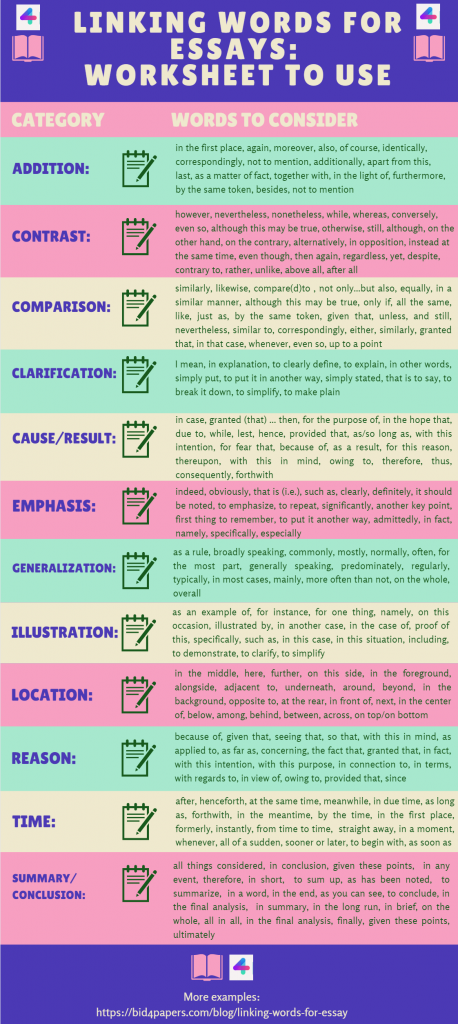
Do you need more guides and worksheets like this to assist you with academic writing? Please share your ideas in the comments, and our writers will be happy to help!
Linking words and phrases are used to show relationships between ideas. They can be used to join two or more sentences or clauses.
We can use linking words to give a result, add information, summarize, give illustrations, emphasize a point, sequence information, compare or to contrast idea.
In this article, you will learn about the most common linking words and phrases:
Giving a Result
Usage: To provide the result of what has been stated or has occurred
Linking Words:
- As a result
- As a consequence
- Therefore
- Thus
- Consequently
- Hence
- For this reason
- Due to
Examples:
- His wife left him. As a result, he became very depressed.
- She has lived in France, and as a consequence she speaks French fluently.
- We do not have enough money. Therefore we cannot afford to buy the new car.
- We do not own the building. Thus, it would be impossible for us to make any major changes to it.
- There has been a great deal of rain and consequently the reservoirs are full.
- The customer was displeased with her meal, hence the chef prepared a replacement.
- For this reason, they are not a good choice for exterior use.
- Due to a broken wing, this bird can’t fly.
Adding Information
Usage: To add to what has been previously stated
Linking Words:
- Additionally / an additional
- Furthermore
- Also
- Too
- As well as that
- Along with
- Besides
- In addition
- Moreover
- In addition to this
- Apart from this
Examples:
- Additionally, the bus service will run on Sundays, every two hours.
- He said he had not discussed the matter with her. Furthermore, he had not even contacted her.
- We are unable to repair this watch. Also, this is the fourth time this has happened.
- I love wearing earrings. I design and make them too.
- We went to the park today. As well as that, we did some shopping.
- Along with parties and parliaments, elections have lost their charm.
- I can’t afford to go to the concert. Besides, I don’t really like classical music.
- You haven’t paid the rent yet. In addition, you owe me money.
- The report is badly presented. Moreover, it contains inaccuracies.
- John’s grades are terrible because he has been so lazy these days. In addition to this, his relationship to his parents got worse.
- Apart from this paragraph, the report contains a number of sensible initiatives.
Summarizing
Usage: To sump up what has been previously stated
Linking words:
- In conclusion
- To summarize
- Altogether
- In short
- To sum up
- In summary
- Briefly
- To conclude
Examples:
- In conclusion, walking is a cheap, safe, enjoyable and readily available form of exercise.
- To summarize, this is a clever approach to a common problem.
- The food was good and we loved the music. Altogether it was a great evening.
- His novels belong to a great but vanished age. They are, in short, old-fashioned.
- To sum up, there are three main ways of tackling the problem…
- In summary, this was a disappointing performance.
- Briefly, our team is now one of the best in the world.
- To conclude, I want to wish you all a very happy holiday season.
Giving Examples
Usage: To provide examples
Linking words:
- For example/ For instance
- Such as
- Including
- Namely
- In this case
- Proof of this
- Like
Examples:
- There are many interesting places to visit in the city, for example/ for instance, the botanical garden or the art museum.
- I prefer to wear casual clothes, such as jeans and a sweatshirt.
- Including Christmas Day and Boxing Day, I’ve got a week off work.
- We need to concentrate on our target audience, namely women aged between 20 and 30.
- I think I would have made a difference in this case.
- This building are a living proof of this existence, so we must preserve it.
- I also make other jewellery like rings and bracelets.
Emphasizing a Point
Usage: To put forward a point or idea more forcefully
Linking words:
- Undoubtedly
- Indeed
- Obviously
- Particularly / in particular
- Especially
- Clearly
- Importantly
- Absolutely
- Definitely
- Without a doubt
- Never
- It should be noted
- Unquestionably
- Above all
- Positively
Examples:
- Undoubtedly, the story itself is one of the main attractions.
- I don’t mind at all. Indeed, I would be delighted to help.
- Obviously, we don’t want to spend too much money.
- I love silver earrings, in particular ones from Mexico
- The car is quite small, especially if you have children.
- Clearly, this will cost a lot more than we realized.
- More importantly, can he be trusted?
- He’s an absolutely brilliant cook.
- I definitely remember sending the letter.
- We still believe we can win this series without a doubt.
- I’m never surprised at what I do.
- It should be noted that if you have something to note, then note it
- Unquestionably, teaching has been a paramount part of his career.
- Above all, this forest is designed for wear and tear.
- This is positively the worst thing that I can even imagine.
Sequencing Ideas
Usage: To indicate the order of what is being said
Linking words:
- First/ firstly (Second/ secondly, Third/ thirdly, Finally)
- At this time
- Following
- Previously
- Before
- Subsequently
- Above all
- Lastly and most importantly
- Last but not least
- First and foremost
Examples:
- Firstly, I prefer the train because I can see the landscape.
- At this time, the young man leapt into the air and flew off towards sunset.
- They arrived on Monday evening and we got there the following day.
- I had visited them three days previously.
- Your name is before mine on the list.
- Subsequently, new guidelines were issued to all employees.
- Above all, keep in touch.
- Lastly, and most importantly, you should be optimistic.
- Last but not least, I find I seriously cannot relate to women.
- We will continue to focus on our players first and foremost.
Comparing Ideas
Usage: To show how things are similar
Linking words:
- Similarly
- Equally
- Likewise
- Just as
- Just like
- Similar to
- Same as
- Compare / compare(d) to(with)
- By the same token
- In the same way
- Correspondingly
Examples:
- Similarly, the basketball and hockey games draw nearly full attendance.
- Equally, not all customers are honest.
- Her second marriage was likewise unhappy.
- She’s just as smart as her sister.
- Working with housecats is just like working with lions or tigers.
- Some people say I have a running style similar to him.
- Having a power is not the same as using the power.
- He gets the ball off quickly compared to two years ago.
- Teenagers should be more respectful; by the same token, parents should be more understanding.
- Alex enjoys telling jokes; in the same way/similarly/likewise,his son adores funny stories.
- Correspondingly, the roles each of them played were soon different.
Contrasting Ideas
Usage: To show how things are different
Linking words:
- Unlike
- Nevertheless
- On the other hand
- Nonetheless
- Despite / in spite of
- In contrast (to)
- Alternatively
- Conversely
- Even so
- Differing from
- Contrary to
Examples:
- Unlike most systems, this one is very easy to install.
- There is little chance that we will succeed in changing the law. Nevertheless, it is important that we try.
- Laptops are convenient; On the other hand, they can be expensive.
- The problems are not serious. Nonetheless, we shall need to tackle them soon.
- Despite/ In spite of the rain, I went for a walk.
- In contrast to the diligent bee, the butterfly flies hither and yon with no apparent purpose.
- The agency will make travel arrangements for you. Alternatively, you can organize your own transport.
- Northern European countries had a great summer. On the contrary/conversely, Southern Europe had poor weather.
- Even so, many old friends were shocked at the announcement.
- Differing from his white colleagues, he preferred instructing his scholars to the ambition of acquiring personal renown.
- The situation in Ireland is quite contrary to this principle.
An essay is an important piece of writing when a student is seeking college admission. It needs to have a clear flow so that the readability is perfect. Rightly so, the sentences you construct need to flow and lead to each other seamlessly.
Linking or transition words come in handy to make your essay have comprehensible sentences. The words act as the ideal connectors and bridges that eliminate sentence isolation.
Factually, both writing and speaking need linking words that will help the audience form a clear relationship between ideas. Listeners and readers are able to comprehend responses when the right linking words are in place.
What are Linking Words in Essay Writing?
Linking words are the uniformity basis of an essay. When these words are in an essay, they showcase a connection between sentences. As usual, a typical essay consists of different sections and paragraphs.
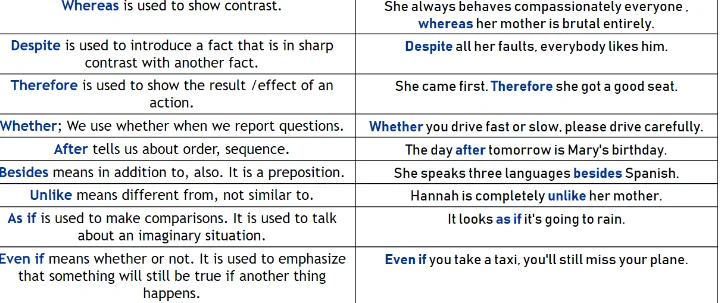
If there are no transition words, the sentences will appear incoherent and messy. The use of linking words clearly show the relationship existing between all sections and paragraphs in an essay.
When writing your essay, make use of linking words as a bridge between the concepts you are writing and ideas in your essay. The readers will enjoy a cohesive piece of essay with texts that are flowing smoothly.
The assessment team has a lot of essays to read and you can make their work easy by using your linking words appropriately. If this is not the case, your professor will have to go through a lot of stress in trying to understand your essay.
Basically, if you want to impress your readers and consequently improve your scores, practice the best linking words skills.
Reasons for Using Linking Words in Essay Writing
Only proper usage of linking words will help you come up with a compelling essay. After toiling to conduct research for your essay, improper structure of sentences will make your efforts go to waste.
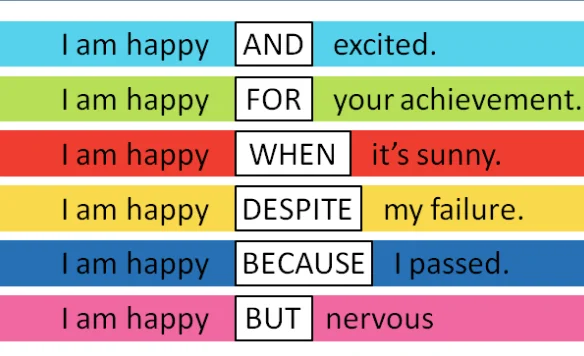
Good students endeavor and strive to create an appealing and expressive essay. A thorough use of the right linking words will make your presentation and persuasion of ideas flow perfectly.
Linking words are very crucial in any type of essay. If you do not want your texts to appear clucky, transition words ought to be in place.
Here are more reasons why you need linking words in your essay:
1. Flow of order and sequence
An essay needs flow of texts, ideas and thoughts otherwise it will lose its quality. Therefore, writers need to make huge efforts and use the right linking words that will bring a sequence of order in the essay.
Such words include next, then, firstly, secondly, afterwards, finally and afterwards. Other transition words to use include concurrently, at the same time, earlier, first of all, following this and for now.
A good sequence order in your essay is also enhanced when you use words such as lastly, in the end, in the beginning or once upon a time.
2. Showcasing comparison
There are essays that will require the writer to show comparison. Linking words play an important role in contrast and argumentative essays.
If you need to bring out comparison clearly, consider the use of words such as similarly, equally, comparable, in the same time and likewise.
Apart from same as, other words or phrases to use include just like, just as and comparably.
3. Contrasting
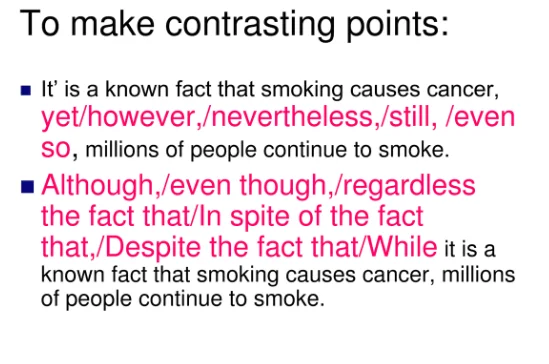
Transition words are the best when you want to bring out contrast in a sentence. In most of the cases, place then at the beginning or in the middle of your sentence to create the right contrast.
However, despite this, yet, whereas and alternatively are some of the words you can use.
4. Illustration of examples
There are places in your essay where you will have to give examples. Obviously, most essays will need illustration of evidence with the use of linking words.
Giving examples without these words will make your text to sound blunt.
Linking words such as for instance, in the case of, and for instance will make it easy to introduce your examples.
5. Including additions
You will also need to use linking words when putting additions in your essays. These words will ensure that you have added a txt with the correct meaning to your essay.
Furthermore, also, secondly, in addition and moreover are some of the linking words to use.
6. Introduction of cause and effects
Cause and effects in an essay can help the writer draw a sensible conclusion. In essence, it helps to bring about good connection of the essay when a conclusion is being added. Therefore, the relationship between cause and effect is better shown using the right linking words.
Owing to, thus, since, as a result of and because are some of the transition words you can use. Other words to use include stems from, leads to, results from, for this reason etc.
7. For conclusion purposes
Starting an impressive essay can only be better if the conclusion is attractive. It is good to bring about the conclusion using appropriate linking words that are not common.
You can conclude your essay using words such as finally, in conclusion, summarizing, in summary and briefly.
As a writer, you need to bear in mind that adjusting and positioning these words is a must if you are to impress your readers.
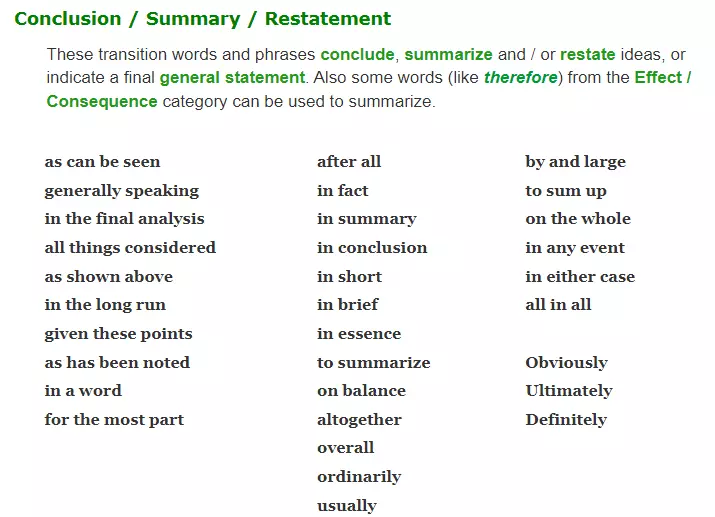
Dos of Using Linking Words
- Adjust and position your linking words properly otherwise the reader will not be impressed.
- Do mix up the linking words you use. Using one word several times can be very annoying to the reader. Since the transition phrases are many, mix them up in your essay to avoid repetition.
- Be accurate in using these words when connecting your ideas in an essay. Know the difference between these phrases to understand the meaning correctly.
- You can use these words when you want to accentuate a point. In other words, use them to stress something important in your writing.
30 Examples of Linking Words for Essay Writing
- On the flipside
- On the contrary
- By and large
- As a consequence of
- In conclusion
- Above all
- Following this
- At this point of time
- In the same way
- As an example
- In other words
- To put it differently
- Under the circumstances
- That is to say
- With this intention
- Subsequently
- All in all
- In brief
- In order to
- Primarily
- Of less importance
- What’s more
- Meanwhile
- Furthermore
- Alternatively
- In spite of
- To illustrate
- To demonstrate
- In the middle of
- For the avoidance of doubt
Wrapping Up on Linking words on Essay Writing
You can’t overlook the significance of linking words in essay writing. Transition words are important in bringing ideas together so that they appear as a whole in your essay.
All in all, an essay that flows well must incorporate the right transition words to link arguments and actions. The readers will be able to connect an event that took place because of a consequence of a different action.
Essays need to have a flow of ideas with each one building on the other. Yet still, organization of thoughts in essay writing is valuable and this is where linking words play a critical role.
To sum it up, the more your thoughts are in good organization, the smoother your essay will flow. When you use linking words appropriately, your piece will have a logical structure that is appealing to the reader.
When not handling complex essays and academic writing tasks, Josh is busy advising students on how to pass assignments. In spare time, he loves playing football or walking with his dog around the park.
Сегодня мы поговорим о словах-связках (linking words) и фразах-связках в английском языке.
Содержание статьи:
Что такое linking words and phrases?
Таблицы linking words с переводом.
Упражнения на отработку linking words and phrases.
Что такое linking words and phrases?
В английской речи или на письме Вы можете использовать слова-связки (linking words) или короткие фразы (linking phrases), которые помогут организовать Вашу речь и сделать ее более логичной и понятной для того, кто Вас слушает или читает.
Слова-связки могут быть разными частями речи. Linking words важны для написания достойного и связного эссе (essay writing).
Обратите внимание, на использование слов-связок: неправильное использование linking words в английском языке может полностью изменить смысл того, что вы пытаетесь сказать.
Ниже приводятся таблицы слов-связок и фраз-связок с переводом. Этот перечень не является исчерпывающим. Будьте осторожны: хотя linking words and phrases сгруппированы в наших таблицах по сферам применения, слова-связки в каждой из таблиц не являются синонимичными – для их правильного применения необходимо уточнить перевод, а также место в предложении.
Некоторые слова-связки и фразы используются в нескольких таблицах, так как могут иметь различное (логическое) значение.
|
Listing (слова-связки, используемые для перечисления, организации логической последовательности). |
|
|
first, second, third |
Первое, второе, третье |
|
firstly, secondly, thirdly |
Во-первых, во-вторых, в-третьих |
|
first, furthermore, finally |
Во-первых, кроме того, наконец-то |
|
to begin, to conclude, in conclusion |
Для начала, чтобы сделать вывод, в завершение |
|
next, last, finally |
следующий, последний, наконец |
|
In addition, moreover |
Кроме того, кроме того |
|
Further, furthermore |
Далее / кроме того, |
Примеры с переводом
Firstly, it could be rather risky, secondly, we don’t have enough qualification. – Во-первых, это может быть очень рискованно, во-вторых, у нас нет достаточной квалификации.
And, moreover, Greg was a man of stainless character. – И, более того, Грег был человеком с честным характером.
|
Reinforcement (слова-связки, употребляющиеся для усиления, подкрепления мысли ) |
|
|
also |
также |
|
furthermore |
кроме того |
|
moreover |
более того |
|
what is more |
более того |
|
in addition |
кроме того |
|
besides |
кроме того |
|
above all |
прежде всего |
|
as well (as) |
также (как) |
|
in the same way |
таким же образом |
|
not only … but also |
не только … но и |
Примеры с переводом:
And, besides, I did not know the whole truth myself then. – И, кроме того, я и сам-то всей правды тогда не знал.
Molly is not only intelligent but also beautiful. – Молли не только умна, но и красива.
|
Similarity (слова-связки для выражения схожести / похожести) |
|
|
equally |
одинаково |
|
likewise |
также |
|
similarly |
аналогично |
|
correspondingly |
соответственно |
|
in the same way |
таким же образом |
Примеры с переводом
Development banks, likewise, increased their loan commitments in 1999. — Банки развития также увеличили объем своих кредитов в 1999 году.
|
Giving examples (слова-связки для примера, введения дополнительной информации) |
|
|
for example |
например |
|
for instance |
например |
|
as follows: |
следующим образом: |
|
that is |
то есть |
|
namely |
а именно |
|
in other words |
другими словами |
Примеры с переводом:
Three students were mentioned, namely John, Sarah and Sylvia. – Трое студентов были упомянуты, а именно Джон, Сара и Сильвия.
China, for example, faces increasing export difficulties – Китай, к примеру, все больше сталкивается с проблемами в области экспорта.
|
Summary (слова связки для подведения итогов высказывания) |
|
|
in conclusion |
в заключение |
|
to conclude |
в заключение |
|
in brief |
в кратце |
|
to summarise |
подводя итог |
|
overall |
в целом |
|
therefore |
поэтому |
Примеры с переводом:
I wish in conclusion to express the view of the Group. — В заключение я хотел бы выразить мнение Группы.
But overall, the situation has not changed much. — Однако в целом ситуация существенно не изменилась.
|
Expressing an alternative (слова-связки, которые используются для выражения альтернативы) |
|
|
alternatively |
в качестве альтернативы / как вариант |
|
rather |
скорее |
|
on the other hand |
с другой стороны |
|
the alternative is |
Альтернатива такова |
|
another possibility would be |
другой возможностью могло бы быть |
Примеры с переводом:
Alternatively, we can assume that price changes stay large even as the period gets shorter. –В качестве альтенативы, можно предположить, что изменения цен остаются значительными, даже в случае сокращения периода.
|
Result/consequence (слова-связки для выражения результата / следствия) |
|
|
so |
так |
|
therefore |
поэтому |
|
as a result/consequence |
в результате/вследствие |
|
accordingly |
соответственно |
|
consequently |
следовательно |
|
because of this/that |
из-за этого/ того |
|
thus |
таким образом |
|
hence |
Отсюда |
|
for this/that reason |
По этой / той причине |
|
so that |
так что |
|
in that case |
в том случае |
|
under these circumstances |
при таких обстоятельствах |
Примеры с переводом:
Central Asia thus remains only weakly integrated into the world economy. – Центральная Азия, таким образом, остается лишь ограниченно интегрированной в мировую экономику.
In these circumstances, there will be temporary financial loss to fishermen. – В таких обстоятельствах рыбаки будут терпеть временные финансовые потери.
|
Stating the obvious (слова-связки для выражения очевидности мысли) |
|
|
obviously |
очевидно |
|
clearly |
ясно |
|
naturally |
естественно |
|
of course |
конечно |
|
as can be expected |
как можно ожидать |
|
surely |
конечно |
|
after all |
Ведь, в общем, помимо прочего |
|
Undoubtedly |
Несомненно |
|
Indeed |
Действительно |
Примеры с переводом:
«I’ve obviously missed something,»– Видимо, я что-то недопонял.
He was, after all, a humorless child. — Он, в общем, и в детстве обладал не слишком развитым чувством юмора.
|
Emphasis (слова-связки для акцентирования мысли) |
|
|
Generally |
Вообще |
|
Admittedly |
Правда |
|
In fact |
На самом деле |
|
Particularly / in particular |
Особенно / в особенности |
|
Especially |
Особенно |
|
Importantly |
Главное |
Примеры с переводом:
Admittedly, the dates haven’t been fixed yet. – Правда, сроки еще не указаны.
More importantly, nine new services will be offered to our customers. – И, что еще важнее, клиентам будут предложены девять новых видов услуг.
Linking words exercises. Упражнения на слова-связки.
Exercise 1. Choose the correct answers to the given text.
There are many reasons for visiting the city of Rome. _________ (1) , it is a city with an interesting history.__________ (2), it was the capital of the Roman Empire. _________ (3), Rome is very beautiful, _________ (4) its many palaces, churches and squares. __________ (5), many of the city’s classical monuments have been preserved, __________ (6) it is possible to see how the city used to be. ___________ (7), many people travel to Rome every year. ____________ (8), I believe that, ___________ (9) a trip to Rome may be expensive, it is well worth visiting such a wonderful city.
|
A |
B |
C |
|
|
1 |
Since |
On the whole |
Firstly |
|
2 |
Secondly |
Finally |
Therefore |
|
3 |
in order to |
Moreover |
All in all |
|
4 |
due to |
because |
so |
|
5 |
Apart from |
However |
In addition |
|
6 |
because |
so |
And |
|
7 |
Because |
But |
For this reason |
|
8 |
To sum up |
Although |
For example |
|
9 |
moreover |
although |
due to |
Exercise 2. Choose the correct linking word.
- I have never been here before… (as/but/and) my friend has.
- We took a taxi… (in short/but/because) we were late.
- This house is beautiful… (In addition to/ However/ Because), it is in poor condition.
- I was tired, … (so/for example/since) I went to bed early.
- … (All in all / Despite / Although) she felt ill, she didn’t call the doctor.
- Some foods, … (moreover/as a result/such as) chocolate, are very fattening.
- Everyone attended the meeting… (whose / whereas / apart from) Steve, who was on holiday.
- Is this the boy… (whose/which/ what) parents own the factory.
Ответы к упражнениям на linking words.
Ex. 1.
1c, 2a, 3b, 4a, 5c, 6b, 7c, 8a, 9b
Ex. 2.
1 but, 2 because, 3 however, 4 so, 5 although, 6 such as, 7 apart from, 8 whose
Понравилось? Сохраните на будущее и поделитесь с друзьями!











